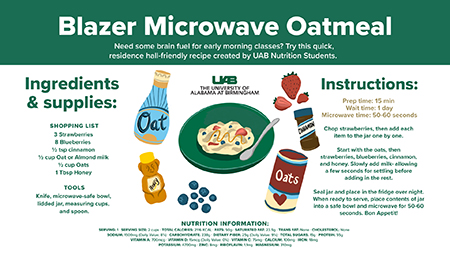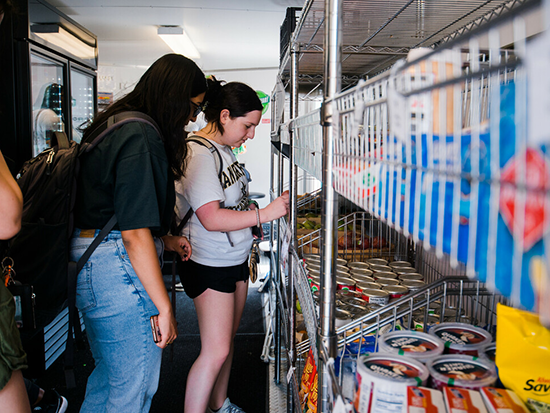 Lizzy Davis, Ph.D.,
Lizzy Davis, Ph.D.,
Photography: Lexi CoonFor first-time college students or those living in residence halls, eating healthy can be a challenge. However, University of Alabama at Birmingham nutrition experts say there are simple, practical ways students can eat healthy while living the residence hall life.
“College is an important time when people are more in control over their eating habits,” said Lizzy Davis, Ph.D., an assistant professor with the UAB Department of Nutrition Sciences. “It’s important to establish habits they will carry with them throughout their life, like cooking or buying groceries.”
Davis says there are several things college students can begin doing that will help them in the long run.
Take advantage of your space
Davis recommends stocking up on foods with a long shelf life (nuts, seeds, dried fruit, instant brown rice and oatmeal) by storing them in an airtight container under your bed.
“Also stock up on other items that won’t need refrigerator space, like apples or citrus fruits,” Davis said. “Both of these don’t require refrigeration for roughly two weeks. This will save room for perishable items if your residence hall allows for a mini fridge.”
As for mini fridge items, Davis recommends stocking up on foods packed with calcium, zinc and vitamin B12, like dairy and lean meats.
Some students in residence halls may have access to a microwave in their room or suite — another way they can take advantage of the space they are given and maximize their opportunities to eat healthy.
Shop at grocery stores, not convenience stores
 Recipe developed by students in UAB’s NTR 330: Nutrition and Metabolism class. Click image to enlarge. While some college students may have barriers to accessing grocery stores, Davis says one pitfall that students run into is stocking up on processed snacks and low-nutritional-value foods at convenience stores.
Recipe developed by students in UAB’s NTR 330: Nutrition and Metabolism class. Click image to enlarge. While some college students may have barriers to accessing grocery stores, Davis says one pitfall that students run into is stocking up on processed snacks and low-nutritional-value foods at convenience stores.
One way to clear this hurdle is by utilizing ride-shares to grocery stores.
“Ride-shares can be extremely useful and a fun outing for you and your friends,” she said. “It can also be inexpensive if students pool their money for the ride.”
At UAB, students have access to the Live HealthSmart Alabama Mobile Market to purchase affordable produce and healthy foods. Additionally, both Blazer Kitchen locations, at Hill Student Center and 1613 11th Ave. South, provide any UAB students experiencing financial need and/or food insecurity with perishable and non-perishable foods, personal hygiene items, and school supplies.
Make a meal together
 Live HealthSmart Alabama Mobile MarketDavis says enjoying a meal with friends and/or roommates is a great way to cut down on costs and food waste.
Live HealthSmart Alabama Mobile MarketDavis says enjoying a meal with friends and/or roommates is a great way to cut down on costs and food waste.
“Potluck/family-style meals or food swaps are a great way to have a good meal,” she said. “Another option is to split a recipe between friends and have everyone bring one ingredient. It’s a great way to spend time with friends and make a healthy meal together.”
Get your daily nutrients
Davis says research points to college students’ not getting enough zinc, calcium or B12.
“Poultry, red meat, beans and nuts are great sources of zinc,” she said. “Obviously, you can get calcium from dairy products, but also from dark green leafy vegetables. Dairy products, bananas and fortified cereals also provide B12.”